FOUR NOVELS.*
WE give the first place in a set of rather inferior novels by writers who are quite capable of better than third-rate work, to Mrs. Alexander's A Second Life, not because it is noticeably good in itself, but because in its way it is a conscientious, three- volume performance. Mrs. Alexander has worked hard, and has striven to make the very most of her incidents, her char- acters, and her conversations. It were to be wished, indeed, that Mrs. Alexander could lay in a small stock of Mr. Arnold's holy horror of "useless labour." It is long since we came across a book which has tempted us so sorely to indulge in skipping, simply because it contains such a superabundance of details. Why, for example, should half a page be devoted to twaddling ball- room criticism and slang like this P- " Who is Trevor dancing with P'—' Nice, dainty-looking darling !'
- No great beauty to boast of.'—` Don't know—uncommon fine eyes.'—' Well-bred look about the head.'—' She isn't a patch on Laura Carrington.'—'Trevor is always discovering hidden treasures.'
— ' Thinks no one a judge but himself.'—' She dances wonderfully for a mere school-girl.'—' Nothing to make a row about.'"
Mildred Carr, the heroine of the story, marries Welby, a monster of Dissent, vulgarity, and selfishness, a sort of compound of Quilp and of a Scotch "ruling elder." She discovers his character, and then husband and wife reproach each other superabund- antly. Mrs. Alexander might have spared us some broadsides of family Billingsgate like this :—
"'I suppose I am guilty of your mother's death, eh ? I, who took her out of beggary, and surrounded her with every comfort.'—' Yon, who treated her like a servant, and forced her to feel every hour that she was a useless incumbrance, for whom there was no room in life The central incident in A Second life is striking enough. Mildred Welby, to escape from the tyranny of her husband, conspires, with the help of a Polish guide, to have it universally believed that she has either fallen or thrown herself into an Alpine crevasse. She is thus able, although her husband is alive, to lead a second and self-supporting life as an amanuensis. Nor does she reveal herself until her husband is on the point of committing bigamy, to prevent which it is necessary for her to make him understand the deception she has committed. Here again Mrs. Alexander wearies us with the details of Mildred's life with a capricious woman, and of the atten- tions, some odious and others welcome, which she receives from male friends of her mistress. If Mrs. Alexander had had the power of concentration, she would have made a good one- volume novel out of the story given with such tedious fulness in A Second Life. For she has undoubted capacity for sketching character. Welby, indeed, is too monstrous, at least in the third volume. He really believes himself to be a religions man after a fashion ; and it is, therefore, incredible that he should degenerate, as he does in the long-run, into a swindler. "Uncle Gribble," the good genius of the story, a plain (very plain) man, fussy and easily excited, who helps both Mildred and her brother, is a really clever and humorous sketch.
Looked at as a chapter in the moral history of Graham North, its rather weak hero, On Golden Hinges may be allowed to attain a certain measure of success; it has, besides, an air of freshness about it. Graham North, the son of a broken squire, • A Second Life. By Mrs. Alexander. 3 vols. London : B. Bentley and Son.—On Golden Hinges. By Dora Exupell. 3 vols. London : F. V. White and Co.—Heart's Delight. By Charles Gibbon. 3 vols. London Chatto and Windus.—A Marriage of Convenience. By Harriet Jay. 3 vols. London F. V. White and Co. pays some attentions to Winifred Riddell, the daughter of one of his father's tenants, which she regards in too serious a light. He becomes engaged to Katharine Despard, a woman of beauty and worth, in spite of her being an heiress, to whom he is, besides, really attached. We have in consequence a whole host of complications. Winifred throws herself into the nearest river, and North in vain throws himself in after her. He is persecuted and all but murdered by the infuriated farmer, who believes him to be the cause of his daughter's suicide. As a matter of fact, Winifred has been rescued by a cousin of Katharine, a military hero of a rather Onidaesque pattern, enters his service disguised as a lad, and furthers his designs against North, whose rival this cousin is for the love of Katharine, by appearing repeatedly as a ghost. North is for a time kept from marrying Katharine, and after a morally invigorating amount of work finds himself in the Soudan in the character of a special correspondent. There he saves Winifred from death, at least for a time, and consoles her with the in- formation that he would have married her had she recovered. The Soudan incident is dragged in very clumsily, and there is an air of riskiness—to say the least—about Winifred's position as servant to Major Despard. Yet there is plenty of life in On Golden Hinges, and several of the characters are in every sense good, notably Katharine, Graham, and Dorothy, the matter-of- fact sister of poor, imaginative Winifred. Grass widows, of the favourite Indian or military sort, are quite as much of an infliction in fiction as in real life; yet, after a time, one begins to enjoy the humours, and even to tolerate the tears and affectations of Mrs. Ballairs, who dotes upon Major Despard, but who only believes that she is doted upon in return.
We are sorry to infer from the publication of Heart's Delight that Mr. Charles Gibbon has given himself up to the writing of three-volume dreadfuls. The scene of Heart's Delight is laid in the north of Scotland, and the time must be the present, for among various absurd incidents in an utterly impossible story are attempts to assassinate the Queen by pistol and dynamite. Yet Mr. Gibbon introduces us to a chevalier, who is understood to be the true representative of the House of Stuart, to a sibyl, and to a villain, who is at once a forger, the claimant of an earldom, and the agent of a gang of dynamitards. There is hardly a redeeming feature in Heart's Delight, for Mr. Gibbon, although on Scotch ground, gives no sketches of genuine Scotch character, and contrives—an uncommon occurrence with him—to render even his heroine uninteresting. If Mr. Gibbon is in training for the work of a transpontine playwright, then no more is to be said. At the same time, those of us who enjoyed his earlier work must be permitted to regret that be should be found misusing—or which is worse, not using—his undoubted powers.
In A Marriage of Convenience—the title, by the way, does not give the story in a untsbe]l—Miss Harriet Jay keeps away both from the Green Isle and the green-room. On that account, perhaps, her new story will hardly be as interesting
to her admirers. But it shows a good deal of skill in that peculiar kind of plot-construction which is so dear to the readers of Miss Braddon and Mr. Wilkie Collins. The first part of the story, indeed, rather flags in interest. The motive of Mrs. Meason in preventing her granddaughter, Lady Constance
Howarth, from marrying her cousin Frank, who is also the
man of her choice, is rather an inadequate one. She has a musty old personal pique to gratify, but even that pique is not flavoured—as it ought always to be in such a case—with the
sense of justice. When, however, Lady Constance marries the Duke d'Azzeglio, the ambassador and sensual egotist, above all,
when the Duke takes into his service as private secretary the man to whom he had done the worst of injuries in Venezuela, Miss Jay proceeds skilfully. She displays great cleverness in
making the vindictive Feveral both save Frank Howarth and shoot the Duke. A Marriage of Convenience does not belong to a very high order of fiction, and the writing in it is rather unequal. But it shows Miss Jay to possess undoubted melo- dramatic talent.



































 Previous page
Previous page